Health Insurance Expansion under ACA: Impact on Adverse Selection
VerifiedAdded on 2023/06/11
|9
|2309
|446
Report
AI Summary
This report examines the impact of health insurance expansion, particularly under the Affordable Care Act (ACA), on reducing adverse selection in the health insurance market. It discusses the rationale behind health insurance expansion, highlighting how Medicaid expansion increases coverage among low-income populations and vulnerable groups. The report also explores the economic implications of health insurance expansion, including the reduction in uncompensated care costs, potential increase in GDP, and improved access to healthcare. Furthermore, it analyzes the impact of health insurance expansion on healthcare organizations in New York, focusing on strengthening the healthcare system, reducing costs, increasing state revenue, and boosting hospital revenue. The report concludes that expanding health insurance through the ACA helps mitigate adverse selection and yields significant economic benefits for the United States.
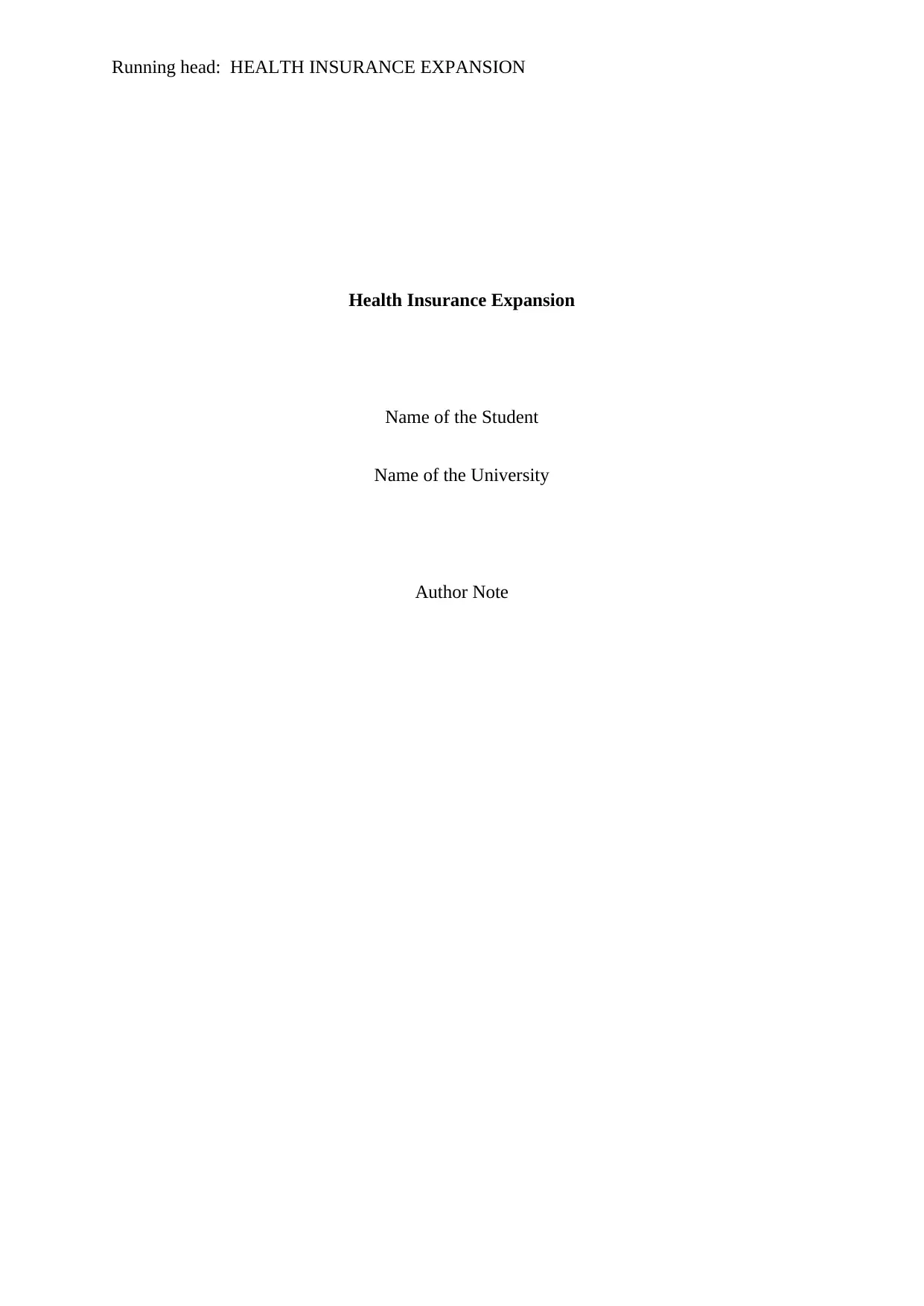
Running head: HEALTH INSURANCE EXPANSION
Health Insurance Expansion
Name of the Student
Name of the University
Author Note
Health Insurance Expansion
Name of the Student
Name of the University
Author Note
Paraphrase This Document
Need a fresh take? Get an instant paraphrase of this document with our AI Paraphraser
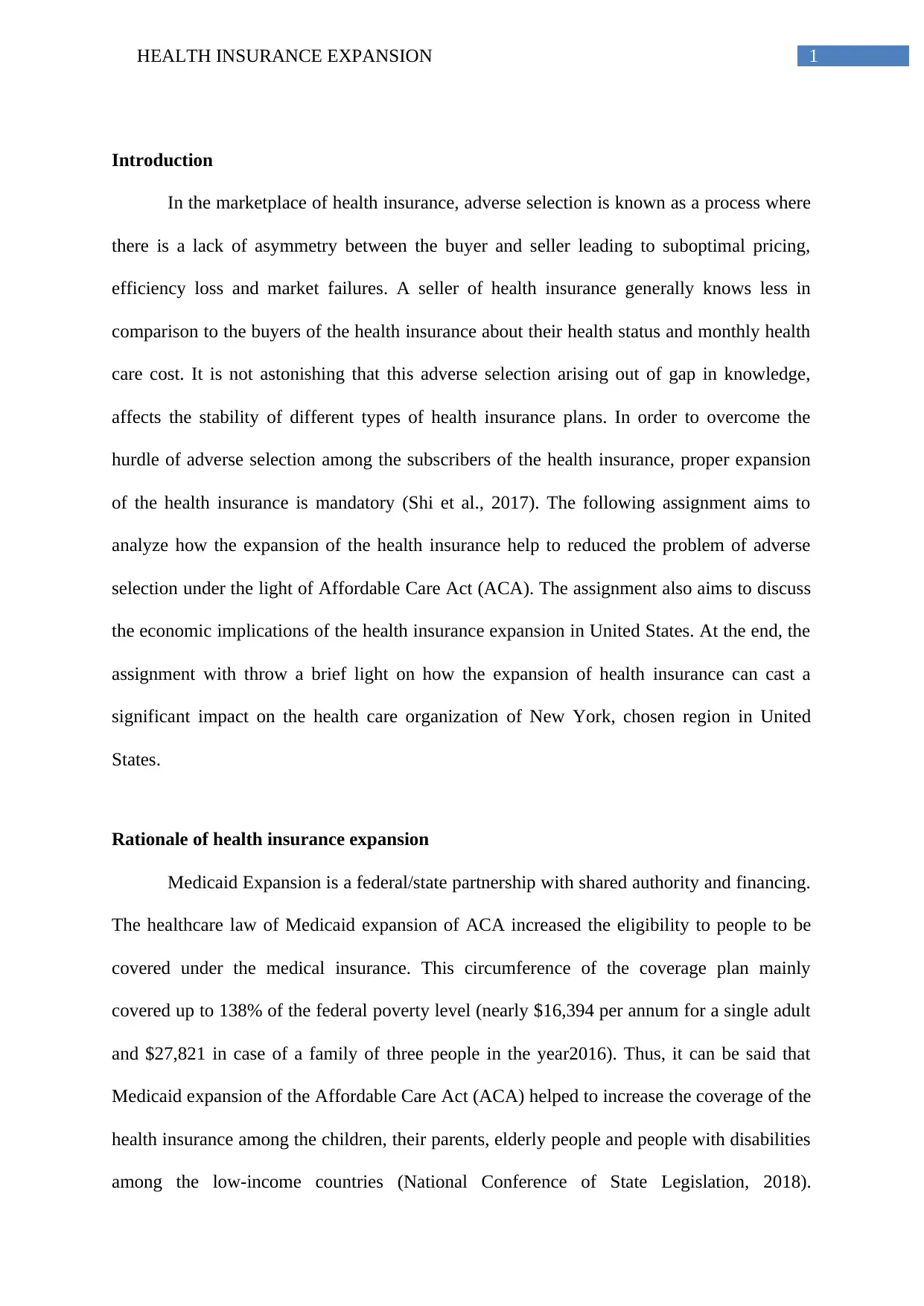
1HEALTH INSURANCE EXPANSION
Introduction
In the marketplace of health insurance, adverse selection is known as a process where
there is a lack of asymmetry between the buyer and seller leading to suboptimal pricing,
efficiency loss and market failures. A seller of health insurance generally knows less in
comparison to the buyers of the health insurance about their health status and monthly health
care cost. It is not astonishing that this adverse selection arising out of gap in knowledge,
affects the stability of different types of health insurance plans. In order to overcome the
hurdle of adverse selection among the subscribers of the health insurance, proper expansion
of the health insurance is mandatory (Shi et al., 2017). The following assignment aims to
analyze how the expansion of the health insurance help to reduced the problem of adverse
selection under the light of Affordable Care Act (ACA). The assignment also aims to discuss
the economic implications of the health insurance expansion in United States. At the end, the
assignment with throw a brief light on how the expansion of health insurance can cast a
significant impact on the health care organization of New York, chosen region in United
States.
Rationale of health insurance expansion
Medicaid Expansion is a federal/state partnership with shared authority and financing.
The healthcare law of Medicaid expansion of ACA increased the eligibility to people to be
covered under the medical insurance. This circumference of the coverage plan mainly
covered up to 138% of the federal poverty level (nearly $16,394 per annum for a single adult
and $27,821 in case of a family of three people in the year2016). Thus, it can be said that
Medicaid expansion of the Affordable Care Act (ACA) helped to increase the coverage of the
health insurance among the children, their parents, elderly people and people with disabilities
among the low-income countries (National Conference of State Legislation, 2018).
Introduction
In the marketplace of health insurance, adverse selection is known as a process where
there is a lack of asymmetry between the buyer and seller leading to suboptimal pricing,
efficiency loss and market failures. A seller of health insurance generally knows less in
comparison to the buyers of the health insurance about their health status and monthly health
care cost. It is not astonishing that this adverse selection arising out of gap in knowledge,
affects the stability of different types of health insurance plans. In order to overcome the
hurdle of adverse selection among the subscribers of the health insurance, proper expansion
of the health insurance is mandatory (Shi et al., 2017). The following assignment aims to
analyze how the expansion of the health insurance help to reduced the problem of adverse
selection under the light of Affordable Care Act (ACA). The assignment also aims to discuss
the economic implications of the health insurance expansion in United States. At the end, the
assignment with throw a brief light on how the expansion of health insurance can cast a
significant impact on the health care organization of New York, chosen region in United
States.
Rationale of health insurance expansion
Medicaid Expansion is a federal/state partnership with shared authority and financing.
The healthcare law of Medicaid expansion of ACA increased the eligibility to people to be
covered under the medical insurance. This circumference of the coverage plan mainly
covered up to 138% of the federal poverty level (nearly $16,394 per annum for a single adult
and $27,821 in case of a family of three people in the year2016). Thus, it can be said that
Medicaid expansion of the Affordable Care Act (ACA) helped to increase the coverage of the
health insurance among the children, their parents, elderly people and people with disabilities
among the low-income countries (National Conference of State Legislation, 2018).
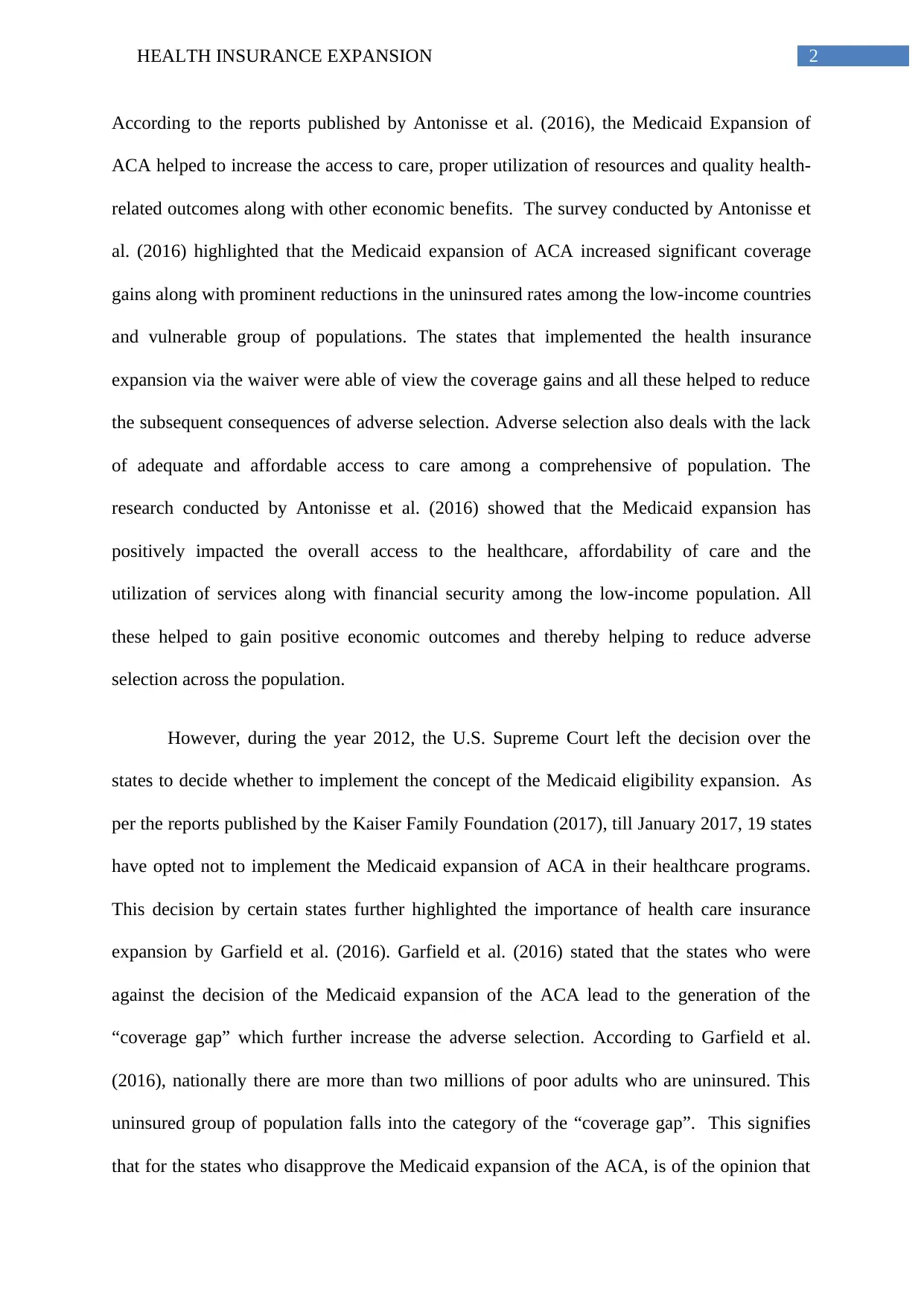
2HEALTH INSURANCE EXPANSION
According to the reports published by Antonisse et al. (2016), the Medicaid Expansion of
ACA helped to increase the access to care, proper utilization of resources and quality health-
related outcomes along with other economic benefits. The survey conducted by Antonisse et
al. (2016) highlighted that the Medicaid expansion of ACA increased significant coverage
gains along with prominent reductions in the uninsured rates among the low-income countries
and vulnerable group of populations. The states that implemented the health insurance
expansion via the waiver were able of view the coverage gains and all these helped to reduce
the subsequent consequences of adverse selection. Adverse selection also deals with the lack
of adequate and affordable access to care among a comprehensive of population. The
research conducted by Antonisse et al. (2016) showed that the Medicaid expansion has
positively impacted the overall access to the healthcare, affordability of care and the
utilization of services along with financial security among the low-income population. All
these helped to gain positive economic outcomes and thereby helping to reduce adverse
selection across the population.
However, during the year 2012, the U.S. Supreme Court left the decision over the
states to decide whether to implement the concept of the Medicaid eligibility expansion. As
per the reports published by the Kaiser Family Foundation (2017), till January 2017, 19 states
have opted not to implement the Medicaid expansion of ACA in their healthcare programs.
This decision by certain states further highlighted the importance of health care insurance
expansion by Garfield et al. (2016). Garfield et al. (2016) stated that the states who were
against the decision of the Medicaid expansion of the ACA lead to the generation of the
“coverage gap” which further increase the adverse selection. According to Garfield et al.
(2016), nationally there are more than two millions of poor adults who are uninsured. This
uninsured group of population falls into the category of the “coverage gap”. This signifies
that for the states who disapprove the Medicaid expansion of the ACA, is of the opinion that
According to the reports published by Antonisse et al. (2016), the Medicaid Expansion of
ACA helped to increase the access to care, proper utilization of resources and quality health-
related outcomes along with other economic benefits. The survey conducted by Antonisse et
al. (2016) highlighted that the Medicaid expansion of ACA increased significant coverage
gains along with prominent reductions in the uninsured rates among the low-income countries
and vulnerable group of populations. The states that implemented the health insurance
expansion via the waiver were able of view the coverage gains and all these helped to reduce
the subsequent consequences of adverse selection. Adverse selection also deals with the lack
of adequate and affordable access to care among a comprehensive of population. The
research conducted by Antonisse et al. (2016) showed that the Medicaid expansion has
positively impacted the overall access to the healthcare, affordability of care and the
utilization of services along with financial security among the low-income population. All
these helped to gain positive economic outcomes and thereby helping to reduce adverse
selection across the population.
However, during the year 2012, the U.S. Supreme Court left the decision over the
states to decide whether to implement the concept of the Medicaid eligibility expansion. As
per the reports published by the Kaiser Family Foundation (2017), till January 2017, 19 states
have opted not to implement the Medicaid expansion of ACA in their healthcare programs.
This decision by certain states further highlighted the importance of health care insurance
expansion by Garfield et al. (2016). Garfield et al. (2016) stated that the states who were
against the decision of the Medicaid expansion of the ACA lead to the generation of the
“coverage gap” which further increase the adverse selection. According to Garfield et al.
(2016), nationally there are more than two millions of poor adults who are uninsured. This
uninsured group of population falls into the category of the “coverage gap”. This signifies
that for the states who disapprove the Medicaid expansion of the ACA, is of the opinion that
⊘ This is a preview!⊘
Do you want full access?
Subscribe today to unlock all pages.

Trusted by 1+ million students worldwide
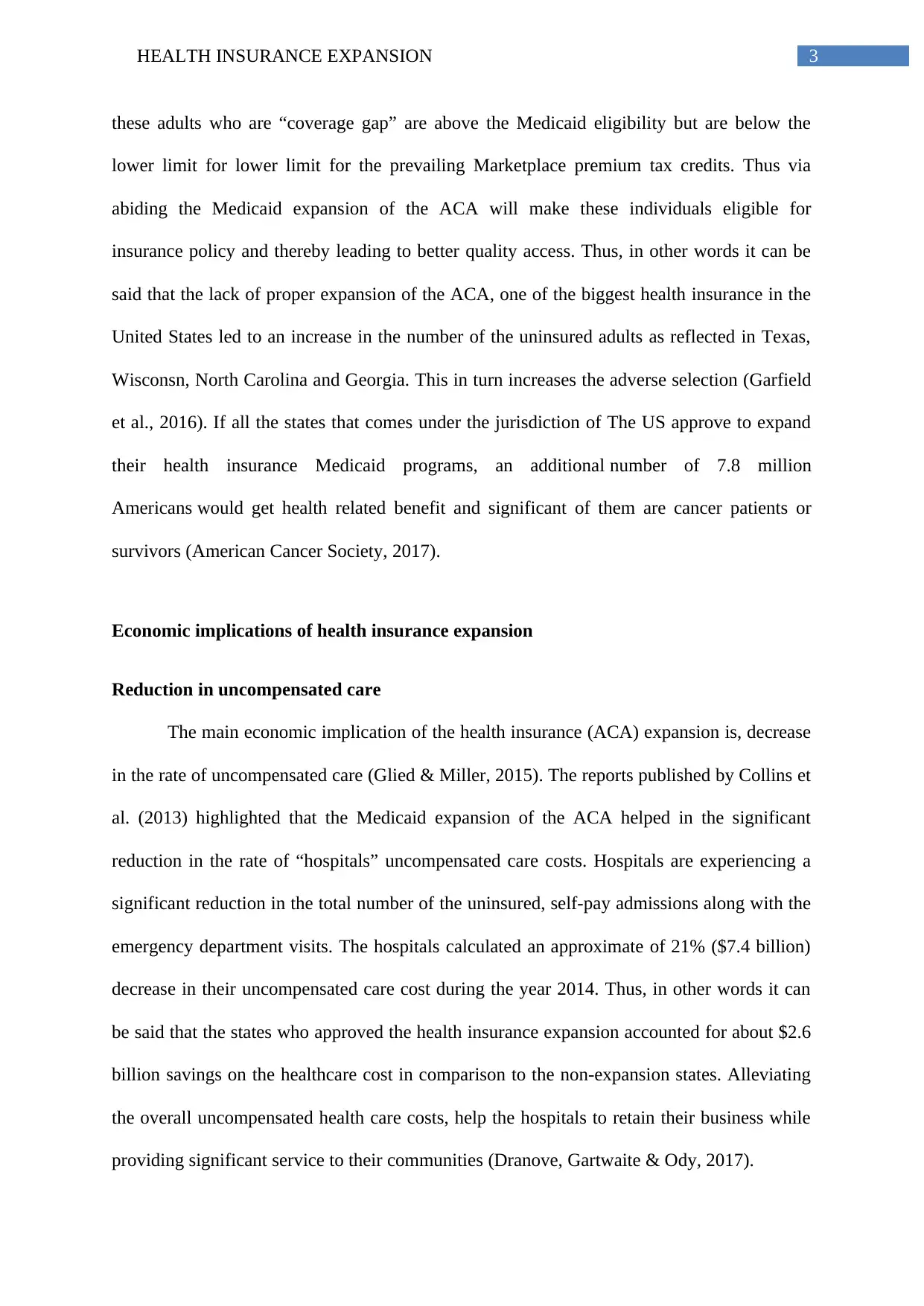
3HEALTH INSURANCE EXPANSION
these adults who are “coverage gap” are above the Medicaid eligibility but are below the
lower limit for lower limit for the prevailing Marketplace premium tax credits. Thus via
abiding the Medicaid expansion of the ACA will make these individuals eligible for
insurance policy and thereby leading to better quality access. Thus, in other words it can be
said that the lack of proper expansion of the ACA, one of the biggest health insurance in the
United States led to an increase in the number of the uninsured adults as reflected in Texas,
Wisconsn, North Carolina and Georgia. This in turn increases the adverse selection (Garfield
et al., 2016). If all the states that comes under the jurisdiction of The US approve to expand
their health insurance Medicaid programs, an additional number of 7.8 million
Americans would get health related benefit and significant of them are cancer patients or
survivors (American Cancer Society, 2017).
Economic implications of health insurance expansion
Reduction in uncompensated care
The main economic implication of the health insurance (ACA) expansion is, decrease
in the rate of uncompensated care (Glied & Miller, 2015). The reports published by Collins et
al. (2013) highlighted that the Medicaid expansion of the ACA helped in the significant
reduction in the rate of “hospitals” uncompensated care costs. Hospitals are experiencing a
significant reduction in the total number of the uninsured, self-pay admissions along with the
emergency department visits. The hospitals calculated an approximate of 21% ($7.4 billion)
decrease in their uncompensated care cost during the year 2014. Thus, in other words it can
be said that the states who approved the health insurance expansion accounted for about $2.6
billion savings on the healthcare cost in comparison to the non-expansion states. Alleviating
the overall uncompensated health care costs, help the hospitals to retain their business while
providing significant service to their communities (Dranove, Gartwaite & Ody, 2017).
these adults who are “coverage gap” are above the Medicaid eligibility but are below the
lower limit for lower limit for the prevailing Marketplace premium tax credits. Thus via
abiding the Medicaid expansion of the ACA will make these individuals eligible for
insurance policy and thereby leading to better quality access. Thus, in other words it can be
said that the lack of proper expansion of the ACA, one of the biggest health insurance in the
United States led to an increase in the number of the uninsured adults as reflected in Texas,
Wisconsn, North Carolina and Georgia. This in turn increases the adverse selection (Garfield
et al., 2016). If all the states that comes under the jurisdiction of The US approve to expand
their health insurance Medicaid programs, an additional number of 7.8 million
Americans would get health related benefit and significant of them are cancer patients or
survivors (American Cancer Society, 2017).
Economic implications of health insurance expansion
Reduction in uncompensated care
The main economic implication of the health insurance (ACA) expansion is, decrease
in the rate of uncompensated care (Glied & Miller, 2015). The reports published by Collins et
al. (2013) highlighted that the Medicaid expansion of the ACA helped in the significant
reduction in the rate of “hospitals” uncompensated care costs. Hospitals are experiencing a
significant reduction in the total number of the uninsured, self-pay admissions along with the
emergency department visits. The hospitals calculated an approximate of 21% ($7.4 billion)
decrease in their uncompensated care cost during the year 2014. Thus, in other words it can
be said that the states who approved the health insurance expansion accounted for about $2.6
billion savings on the healthcare cost in comparison to the non-expansion states. Alleviating
the overall uncompensated health care costs, help the hospitals to retain their business while
providing significant service to their communities (Dranove, Gartwaite & Ody, 2017).
Paraphrase This Document
Need a fresh take? Get an instant paraphrase of this document with our AI Paraphraser
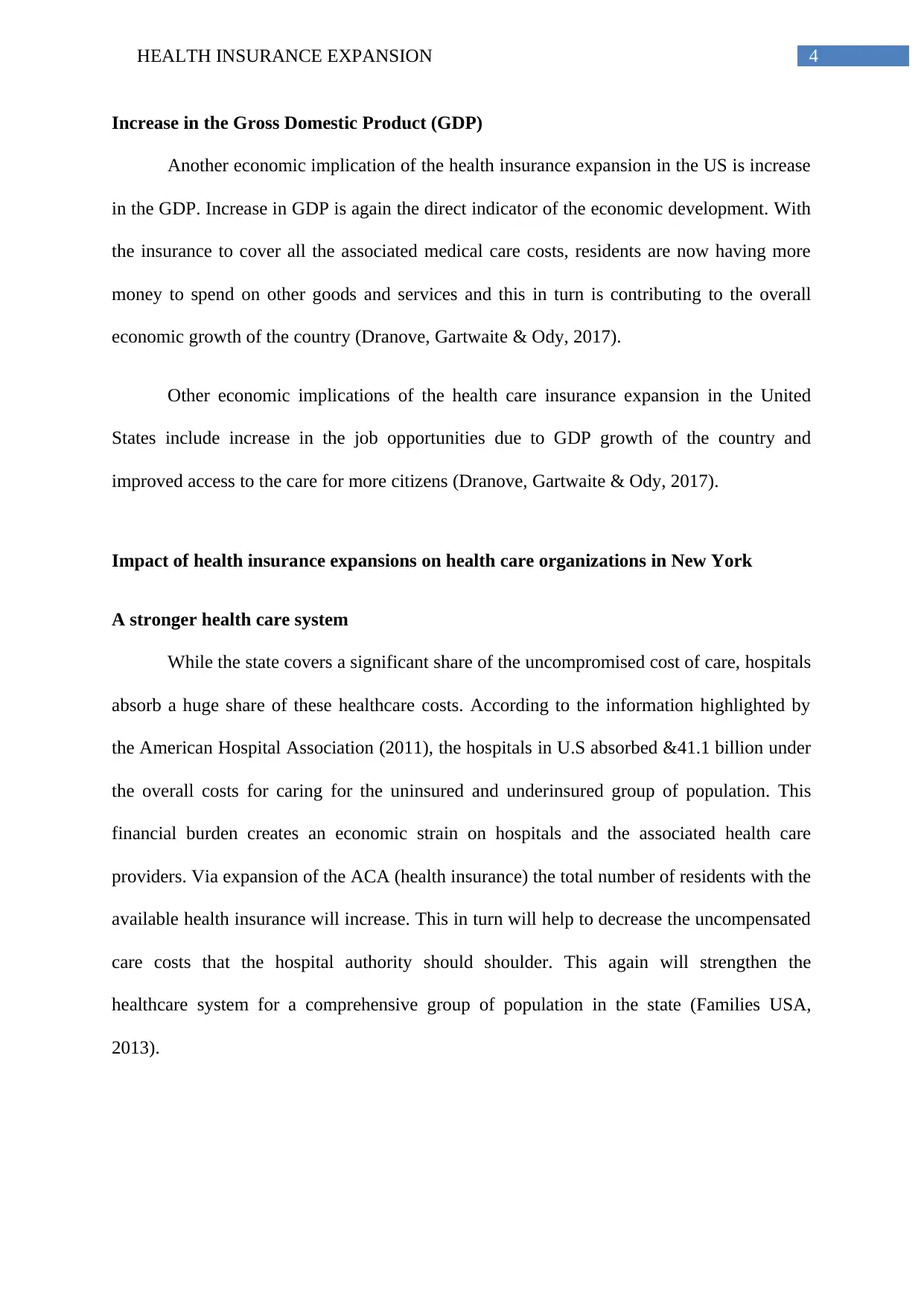
4HEALTH INSURANCE EXPANSION
Increase in the Gross Domestic Product (GDP)
Another economic implication of the health insurance expansion in the US is increase
in the GDP. Increase in GDP is again the direct indicator of the economic development. With
the insurance to cover all the associated medical care costs, residents are now having more
money to spend on other goods and services and this in turn is contributing to the overall
economic growth of the country (Dranove, Gartwaite & Ody, 2017).
Other economic implications of the health care insurance expansion in the United
States include increase in the job opportunities due to GDP growth of the country and
improved access to the care for more citizens (Dranove, Gartwaite & Ody, 2017).
Impact of health insurance expansions on health care organizations in New York
A stronger health care system
While the state covers a significant share of the uncompromised cost of care, hospitals
absorb a huge share of these healthcare costs. According to the information highlighted by
the American Hospital Association (2011), the hospitals in U.S absorbed &41.1 billion under
the overall costs for caring for the uninsured and underinsured group of population. This
financial burden creates an economic strain on hospitals and the associated health care
providers. Via expansion of the ACA (health insurance) the total number of residents with the
available health insurance will increase. This in turn will help to decrease the uncompensated
care costs that the hospital authority should shoulder. This again will strengthen the
healthcare system for a comprehensive group of population in the state (Families USA,
2013).
Increase in the Gross Domestic Product (GDP)
Another economic implication of the health insurance expansion in the US is increase
in the GDP. Increase in GDP is again the direct indicator of the economic development. With
the insurance to cover all the associated medical care costs, residents are now having more
money to spend on other goods and services and this in turn is contributing to the overall
economic growth of the country (Dranove, Gartwaite & Ody, 2017).
Other economic implications of the health care insurance expansion in the United
States include increase in the job opportunities due to GDP growth of the country and
improved access to the care for more citizens (Dranove, Gartwaite & Ody, 2017).
Impact of health insurance expansions on health care organizations in New York
A stronger health care system
While the state covers a significant share of the uncompromised cost of care, hospitals
absorb a huge share of these healthcare costs. According to the information highlighted by
the American Hospital Association (2011), the hospitals in U.S absorbed &41.1 billion under
the overall costs for caring for the uninsured and underinsured group of population. This
financial burden creates an economic strain on hospitals and the associated health care
providers. Via expansion of the ACA (health insurance) the total number of residents with the
available health insurance will increase. This in turn will help to decrease the uncompensated
care costs that the hospital authority should shoulder. This again will strengthen the
healthcare system for a comprehensive group of population in the state (Families USA,
2013).
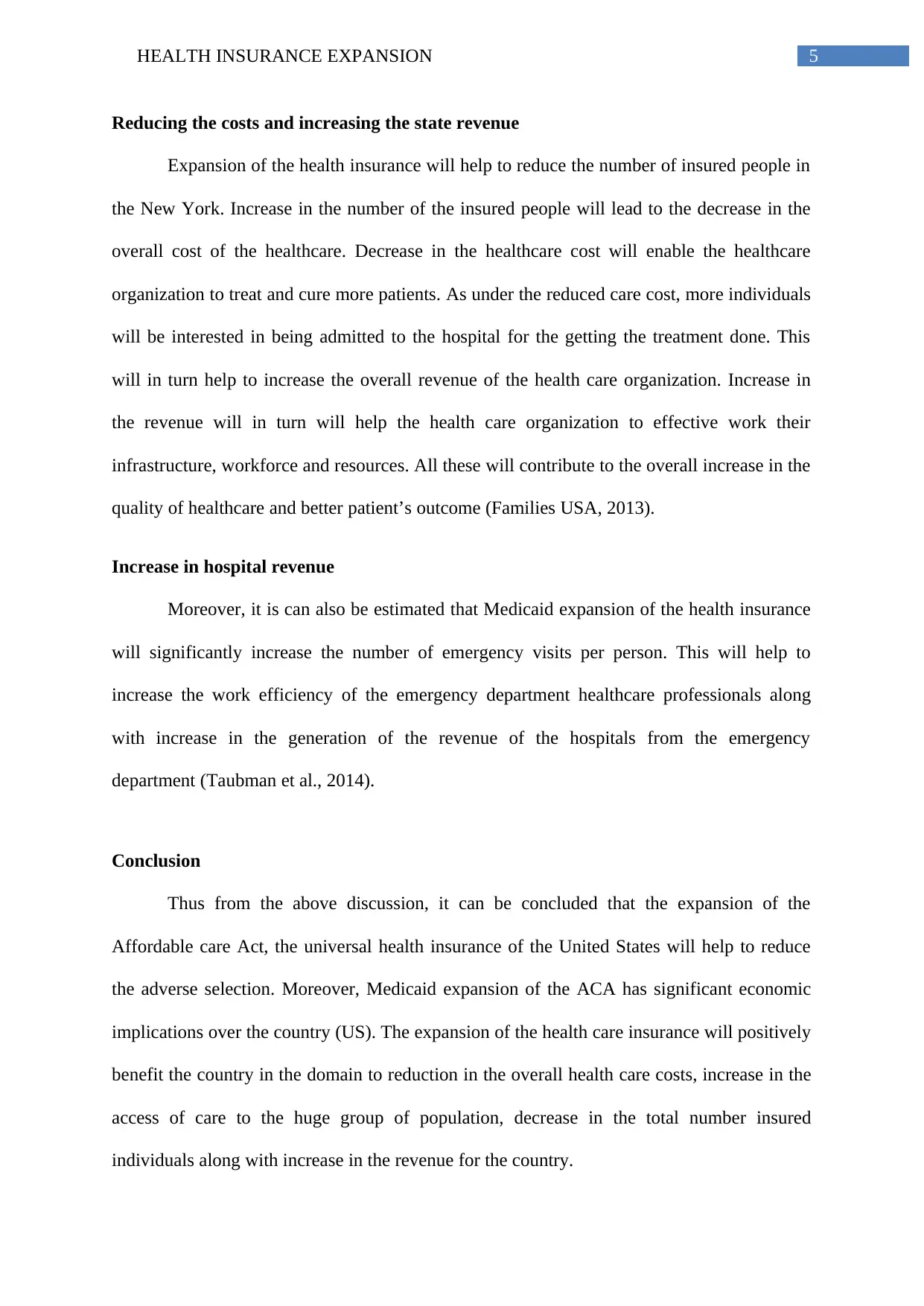
5HEALTH INSURANCE EXPANSION
Reducing the costs and increasing the state revenue
Expansion of the health insurance will help to reduce the number of insured people in
the New York. Increase in the number of the insured people will lead to the decrease in the
overall cost of the healthcare. Decrease in the healthcare cost will enable the healthcare
organization to treat and cure more patients. As under the reduced care cost, more individuals
will be interested in being admitted to the hospital for the getting the treatment done. This
will in turn help to increase the overall revenue of the health care organization. Increase in
the revenue will in turn will help the health care organization to effective work their
infrastructure, workforce and resources. All these will contribute to the overall increase in the
quality of healthcare and better patient’s outcome (Families USA, 2013).
Increase in hospital revenue
Moreover, it is can also be estimated that Medicaid expansion of the health insurance
will significantly increase the number of emergency visits per person. This will help to
increase the work efficiency of the emergency department healthcare professionals along
with increase in the generation of the revenue of the hospitals from the emergency
department (Taubman et al., 2014).
Conclusion
Thus from the above discussion, it can be concluded that the expansion of the
Affordable care Act, the universal health insurance of the United States will help to reduce
the adverse selection. Moreover, Medicaid expansion of the ACA has significant economic
implications over the country (US). The expansion of the health care insurance will positively
benefit the country in the domain to reduction in the overall health care costs, increase in the
access of care to the huge group of population, decrease in the total number insured
individuals along with increase in the revenue for the country.
Reducing the costs and increasing the state revenue
Expansion of the health insurance will help to reduce the number of insured people in
the New York. Increase in the number of the insured people will lead to the decrease in the
overall cost of the healthcare. Decrease in the healthcare cost will enable the healthcare
organization to treat and cure more patients. As under the reduced care cost, more individuals
will be interested in being admitted to the hospital for the getting the treatment done. This
will in turn help to increase the overall revenue of the health care organization. Increase in
the revenue will in turn will help the health care organization to effective work their
infrastructure, workforce and resources. All these will contribute to the overall increase in the
quality of healthcare and better patient’s outcome (Families USA, 2013).
Increase in hospital revenue
Moreover, it is can also be estimated that Medicaid expansion of the health insurance
will significantly increase the number of emergency visits per person. This will help to
increase the work efficiency of the emergency department healthcare professionals along
with increase in the generation of the revenue of the hospitals from the emergency
department (Taubman et al., 2014).
Conclusion
Thus from the above discussion, it can be concluded that the expansion of the
Affordable care Act, the universal health insurance of the United States will help to reduce
the adverse selection. Moreover, Medicaid expansion of the ACA has significant economic
implications over the country (US). The expansion of the health care insurance will positively
benefit the country in the domain to reduction in the overall health care costs, increase in the
access of care to the huge group of population, decrease in the total number insured
individuals along with increase in the revenue for the country.
⊘ This is a preview!⊘
Do you want full access?
Subscribe today to unlock all pages.

Trusted by 1+ million students worldwide
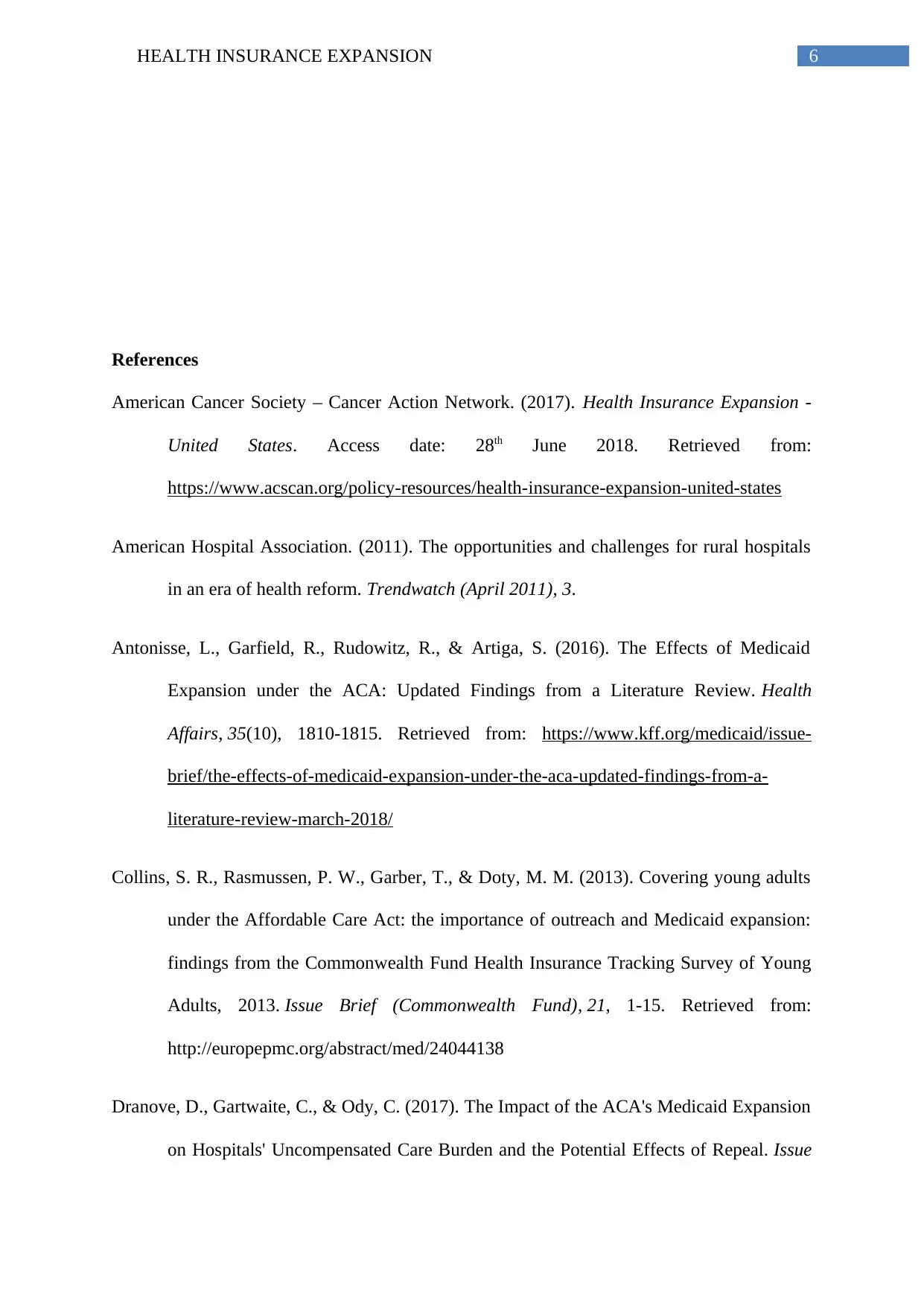
6HEALTH INSURANCE EXPANSION
References
American Cancer Society – Cancer Action Network. (2017). Health Insurance Expansion -
United States. Access date: 28th June 2018. Retrieved from:
https://www.acscan.org/policy-resources/health-insurance-expansion-united-states
American Hospital Association. (2011). The opportunities and challenges for rural hospitals
in an era of health reform. Trendwatch (April 2011), 3.
Antonisse, L., Garfield, R., Rudowitz, R., & Artiga, S. (2016). The Effects of Medicaid
Expansion under the ACA: Updated Findings from a Literature Review. Health
Affairs, 35(10), 1810-1815. Retrieved from: https://www.kff.org/medicaid/issue-
brief/the-effects-of-medicaid-expansion-under-the-aca-updated-findings-from-a-
literature-review-march-2018/
Collins, S. R., Rasmussen, P. W., Garber, T., & Doty, M. M. (2013). Covering young adults
under the Affordable Care Act: the importance of outreach and Medicaid expansion:
findings from the Commonwealth Fund Health Insurance Tracking Survey of Young
Adults, 2013. Issue Brief (Commonwealth Fund), 21, 1-15. Retrieved from:
http://europepmc.org/abstract/med/24044138
Dranove, D., Gartwaite, C., & Ody, C. (2017). The Impact of the ACA's Medicaid Expansion
on Hospitals' Uncompensated Care Burden and the Potential Effects of Repeal. Issue
References
American Cancer Society – Cancer Action Network. (2017). Health Insurance Expansion -
United States. Access date: 28th June 2018. Retrieved from:
https://www.acscan.org/policy-resources/health-insurance-expansion-united-states
American Hospital Association. (2011). The opportunities and challenges for rural hospitals
in an era of health reform. Trendwatch (April 2011), 3.
Antonisse, L., Garfield, R., Rudowitz, R., & Artiga, S. (2016). The Effects of Medicaid
Expansion under the ACA: Updated Findings from a Literature Review. Health
Affairs, 35(10), 1810-1815. Retrieved from: https://www.kff.org/medicaid/issue-
brief/the-effects-of-medicaid-expansion-under-the-aca-updated-findings-from-a-
literature-review-march-2018/
Collins, S. R., Rasmussen, P. W., Garber, T., & Doty, M. M. (2013). Covering young adults
under the Affordable Care Act: the importance of outreach and Medicaid expansion:
findings from the Commonwealth Fund Health Insurance Tracking Survey of Young
Adults, 2013. Issue Brief (Commonwealth Fund), 21, 1-15. Retrieved from:
http://europepmc.org/abstract/med/24044138
Dranove, D., Gartwaite, C., & Ody, C. (2017). The Impact of the ACA's Medicaid Expansion
on Hospitals' Uncompensated Care Burden and the Potential Effects of Repeal. Issue
Paraphrase This Document
Need a fresh take? Get an instant paraphrase of this document with our AI Paraphraser
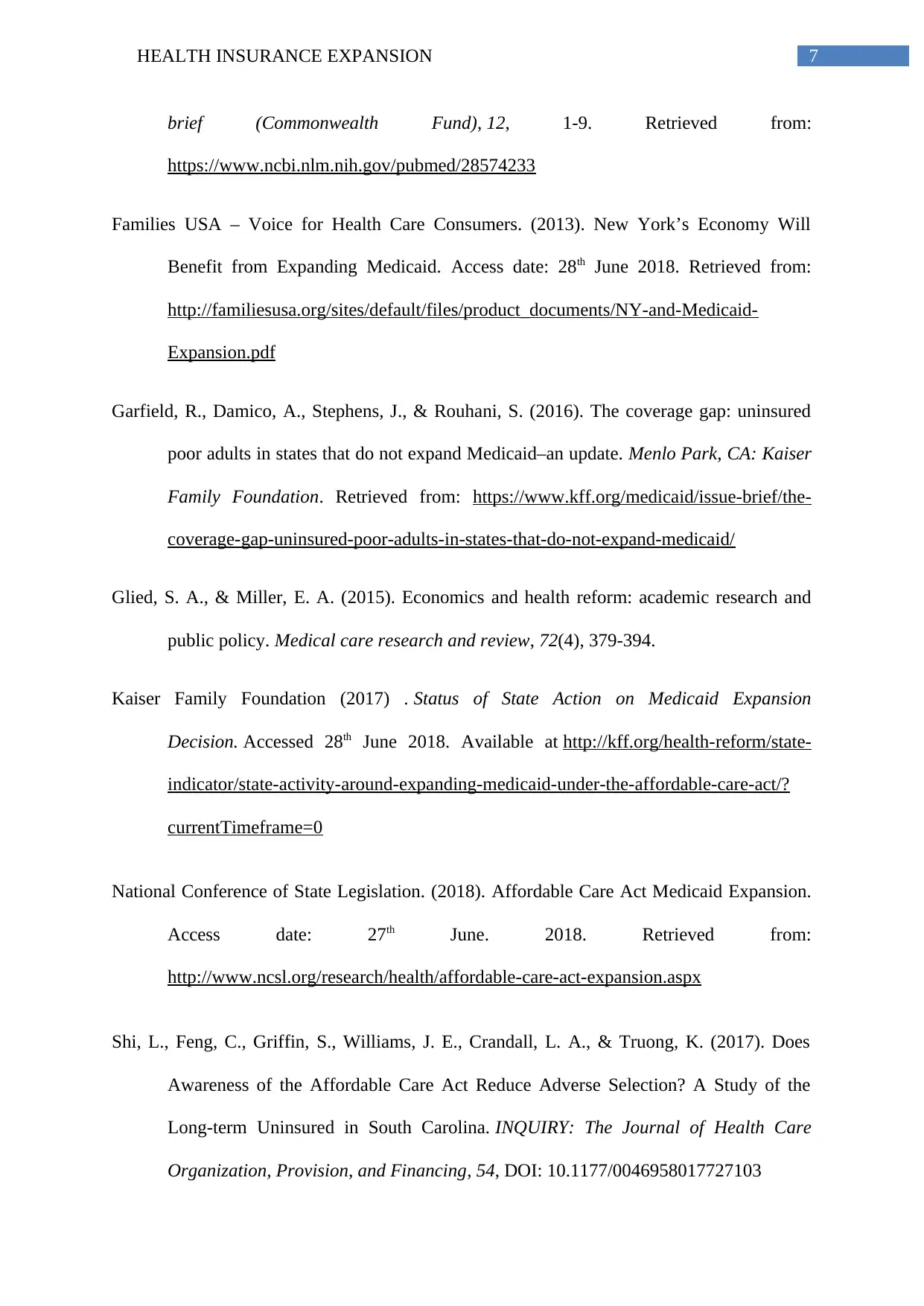
7HEALTH INSURANCE EXPANSION
brief (Commonwealth Fund), 12, 1-9. Retrieved from:
https://www.ncbi.nlm.nih.gov/pubmed/28574233
Families USA – Voice for Health Care Consumers. (2013). New York’s Economy Will
Benefit from Expanding Medicaid. Access date: 28th June 2018. Retrieved from:
http://familiesusa.org/sites/default/files/product_documents/NY-and-Medicaid-
Expansion.pdf
Garfield, R., Damico, A., Stephens, J., & Rouhani, S. (2016). The coverage gap: uninsured
poor adults in states that do not expand Medicaid–an update. Menlo Park, CA: Kaiser
Family Foundation. Retrieved from: https://www.kff.org/medicaid/issue-brief/the-
coverage-gap-uninsured-poor-adults-in-states-that-do-not-expand-medicaid/
Glied, S. A., & Miller, E. A. (2015). Economics and health reform: academic research and
public policy. Medical care research and review, 72(4), 379-394.
Kaiser Family Foundation (2017) . Status of State Action on Medicaid Expansion
Decision. Accessed 28th June 2018. Available at http://kff.org/health-reform/state-
indicator/state-activity-around-expanding-medicaid-under-the-affordable-care-act/?
currentTimeframe=0
National Conference of State Legislation. (2018). Affordable Care Act Medicaid Expansion.
Access date: 27th June. 2018. Retrieved from:
http://www.ncsl.org/research/health/affordable-care-act-expansion.aspx
Shi, L., Feng, C., Griffin, S., Williams, J. E., Crandall, L. A., & Truong, K. (2017). Does
Awareness of the Affordable Care Act Reduce Adverse Selection? A Study of the
Long-term Uninsured in South Carolina. INQUIRY: The Journal of Health Care
Organization, Provision, and Financing, 54, DOI: 10.1177/0046958017727103
brief (Commonwealth Fund), 12, 1-9. Retrieved from:
https://www.ncbi.nlm.nih.gov/pubmed/28574233
Families USA – Voice for Health Care Consumers. (2013). New York’s Economy Will
Benefit from Expanding Medicaid. Access date: 28th June 2018. Retrieved from:
http://familiesusa.org/sites/default/files/product_documents/NY-and-Medicaid-
Expansion.pdf
Garfield, R., Damico, A., Stephens, J., & Rouhani, S. (2016). The coverage gap: uninsured
poor adults in states that do not expand Medicaid–an update. Menlo Park, CA: Kaiser
Family Foundation. Retrieved from: https://www.kff.org/medicaid/issue-brief/the-
coverage-gap-uninsured-poor-adults-in-states-that-do-not-expand-medicaid/
Glied, S. A., & Miller, E. A. (2015). Economics and health reform: academic research and
public policy. Medical care research and review, 72(4), 379-394.
Kaiser Family Foundation (2017) . Status of State Action on Medicaid Expansion
Decision. Accessed 28th June 2018. Available at http://kff.org/health-reform/state-
indicator/state-activity-around-expanding-medicaid-under-the-affordable-care-act/?
currentTimeframe=0
National Conference of State Legislation. (2018). Affordable Care Act Medicaid Expansion.
Access date: 27th June. 2018. Retrieved from:
http://www.ncsl.org/research/health/affordable-care-act-expansion.aspx
Shi, L., Feng, C., Griffin, S., Williams, J. E., Crandall, L. A., & Truong, K. (2017). Does
Awareness of the Affordable Care Act Reduce Adverse Selection? A Study of the
Long-term Uninsured in South Carolina. INQUIRY: The Journal of Health Care
Organization, Provision, and Financing, 54, DOI: 10.1177/0046958017727103
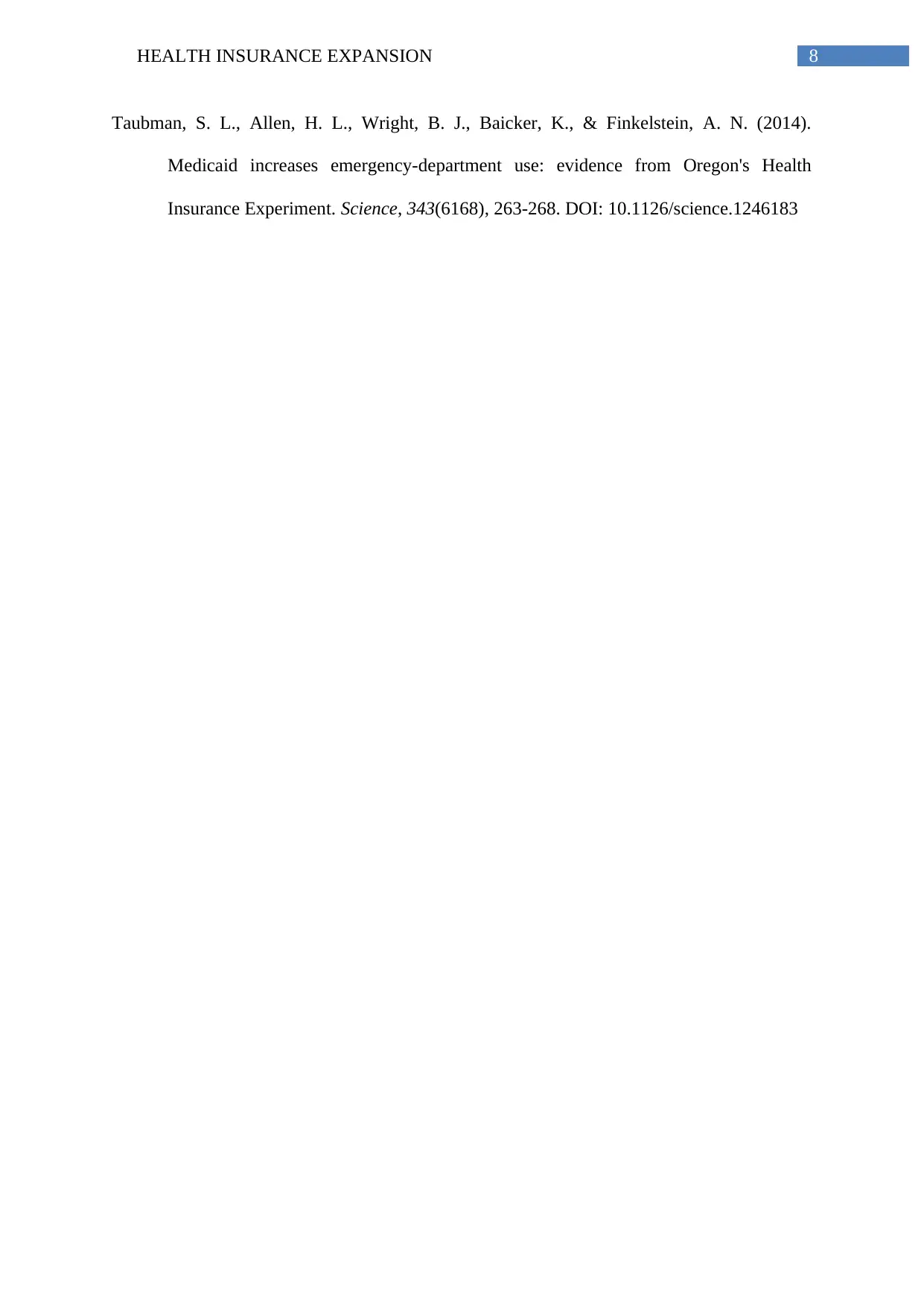
8HEALTH INSURANCE EXPANSION
Taubman, S. L., Allen, H. L., Wright, B. J., Baicker, K., & Finkelstein, A. N. (2014).
Medicaid increases emergency-department use: evidence from Oregon's Health
Insurance Experiment. Science, 343(6168), 263-268. DOI: 10.1126/science.1246183
Taubman, S. L., Allen, H. L., Wright, B. J., Baicker, K., & Finkelstein, A. N. (2014).
Medicaid increases emergency-department use: evidence from Oregon's Health
Insurance Experiment. Science, 343(6168), 263-268. DOI: 10.1126/science.1246183
⊘ This is a preview!⊘
Do you want full access?
Subscribe today to unlock all pages.

Trusted by 1+ million students worldwide
1 out of 9
Related Documents
Your All-in-One AI-Powered Toolkit for Academic Success.
+13062052269
info@desklib.com
Available 24*7 on WhatsApp / Email
![[object Object]](/_next/static/media/star-bottom.7253800d.svg)
Unlock your academic potential
Copyright © 2020–2026 A2Z Services. All Rights Reserved. Developed and managed by ZUCOL.




